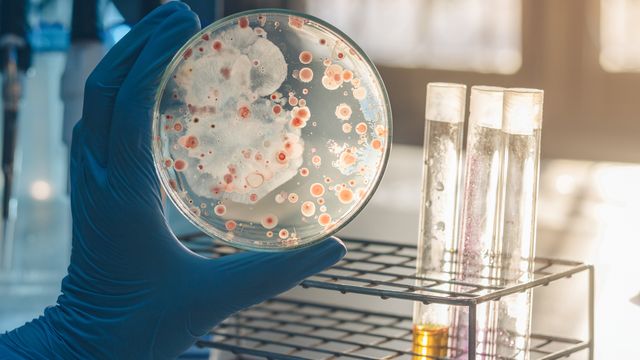Antimicrobial Resistance Culture Testing in Livestock Samples
The emergence of antimicrobial resistance (AMR) is a global health concern that poses significant threats to animal and human health. In the agricultural sector, particularly within livestock production, the use of antibiotics has been a critical tool for disease prevention and treatment. However, prolonged or improper usage can lead to the development of resistant bacterial strains, which could be transferred to humans through the food chain.
Our Antimicrobial Resistance Culture Testing service is specifically designed to identify the presence of antimicrobial-resistant bacteria in livestock samples. This testing methodology adheres to international standards such as ISO 16140-2 and EUCAST guidelines, ensuring accurate and reliable results. The process involves collecting a sample from livestock animals suspected of harboring resistant bacteria, followed by careful preparation and inoculation onto selective media that favors the growth of antimicrobial-resistant organisms.
Once isolated, these cultures are further analyzed using various techniques including disk diffusion tests and minimum inhibitory concentration (MIC) assays. The results provide insights into the specific antibiotics to which the bacteria are resistant, enabling informed decisions regarding antibiotic usage in livestock management practices. This not only helps mitigate the spread of AMR but also supports sustainable farming methods that comply with regulatory requirements.
The testing procedure is highly standardized and involves strict quality control measures at every step, from sample collection to final interpretation. Our team of microbiologists ensures that all tests are conducted under controlled conditions using state-of-the-art equipment such as automated microbial identification systems like VITEK 2 and MALDI-TOF MS for rapid and accurate species identification.
The importance of this testing cannot be overstated, especially given the increasing emphasis on responsible antibiotic use. By identifying resistant strains early, farmers can adopt targeted intervention strategies that reduce the overall usage of broad-spectrum antibiotics. This approach not only enhances animal health but also contributes to public health by minimizing the risk of zoonotic transmission.
| Use Case | Description |
|---|---|
| Antibiotic Stewardship Programs | Supports the development of evidence-based antibiotic stewardship programs that minimize unnecessary antimicrobial usage. |
| Disease Outbreak Investigations | Aids in identifying the causative agents responsible for disease outbreaks and their resistance profiles. |
| Animal Welfare Compliance | Ensures compliance with local, national, and international regulations related to antibiotic use in livestock. |
In conclusion, our Antimicrobial Resistance Culture Testing service plays a crucial role in the fight against AMR by providing essential data that informs best practices in veterinary medicine and agriculture. By leveraging advanced laboratory techniques and adhering to stringent standards, we help stakeholders make informed decisions that promote both animal health and public safety.
Customer Impact and Satisfaction
Our commitment to delivering accurate, reliable, and timely results has earned us a reputation for excellence among our clients. By offering comprehensive antimicrobial resistance testing services, we empower livestock producers, veterinarians, and regulatory bodies with the knowledge they need to make informed decisions.
- Informed Decision Making: Our tests provide detailed information on antibiotic susceptibilities, enabling stakeholders to adopt targeted approaches that optimize treatment efficacy while minimizing resistance development.
- Regulatory Compliance: We ensure compliance with international standards and local regulations, providing peace of mind for our clients regarding their regulatory obligations.
- Economic Benefits: By preventing overuse of antibiotics, our testing helps reduce treatment costs while improving animal health outcomes.
We pride ourselves on delivering exceptional customer service. Our dedicated team is always available to provide support and guidance throughout the testing process, ensuring a seamless experience for all our clients. Whether you are a large-scale producer or a small farm owner, we offer tailored solutions that meet your unique needs.
Customer satisfaction is at the heart of everything we do. We regularly conduct surveys and reviews to ensure that we consistently meet and exceed expectations. Our goal is not only to provide accurate test results but also to foster long-term relationships built on trust and mutual respect.
Environmental and Sustainability Contributions
The issue of antimicrobial resistance (AMR) extends beyond human health; it impacts the environment as well. Excessive or improper use of antibiotics in livestock farming can lead to the release of resistant bacteria into the soil, water bodies, and air. These resilient organisms can persist for extended periods, posing a long-term threat to both animal and human health.
- Reduction in Antibiotic Pollution: By identifying and managing AMR through targeted interventions, we help reduce the environmental footprint of antibiotics in agricultural settings.
- Biodiversity Preservation: Sustainable farming practices that minimize antibiotic use contribute to the preservation of local biodiversity by preventing the disruption of natural ecosystems.
- Resource Efficiency: Efficient use of antibiotics leads to lower treatment costs and reduced waste, contributing to overall resource conservation.
In addition to these direct benefits, our testing services support broader sustainability goals. For instance, by promoting responsible antibiotic use, we contribute to the United Nations Sustainable Development Goal (SDG) 2: End hunger, achieve food security and improved nutrition, and promote sustainable agriculture. This aligns with the objectives of SDG 3: Ensure healthy lives and promote well-being for all at all ages.
Our efforts in this area are not only beneficial to our clients but also contribute positively to global environmental sustainability initiatives. By adopting a proactive approach towards AMR, we help create a more resilient agricultural sector that is better equipped to face the challenges of the future.





